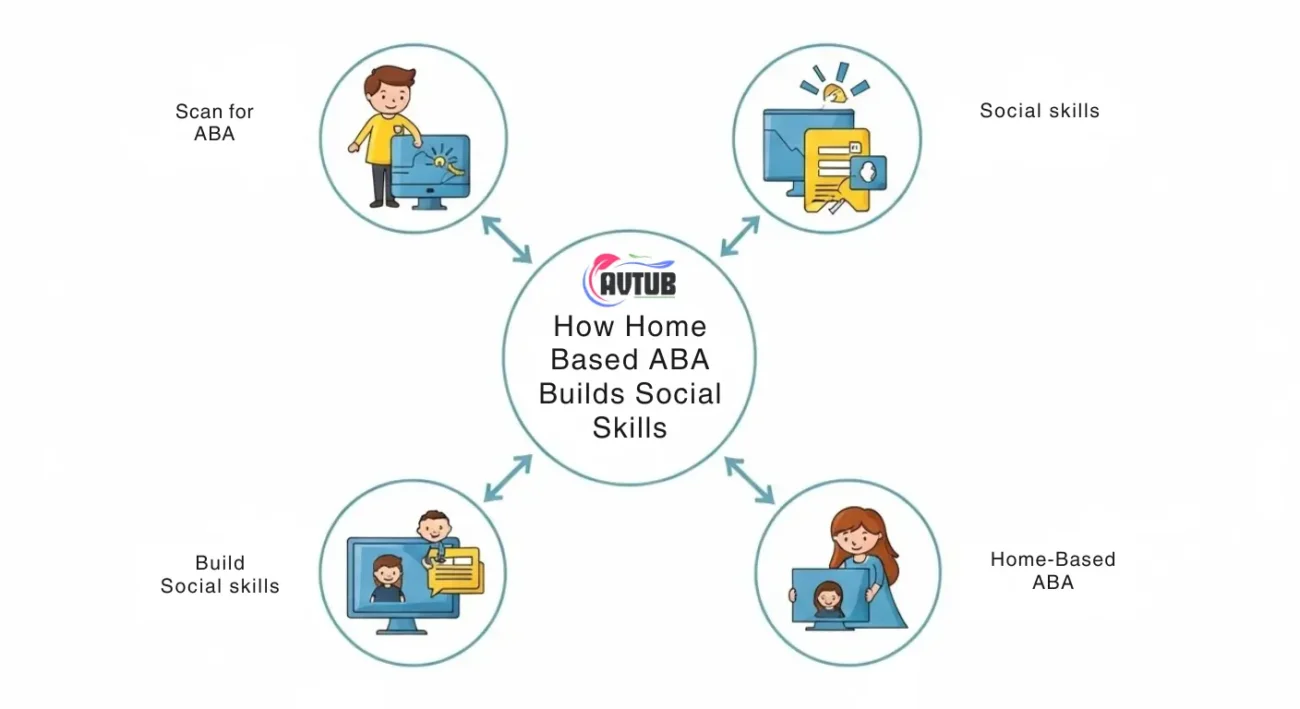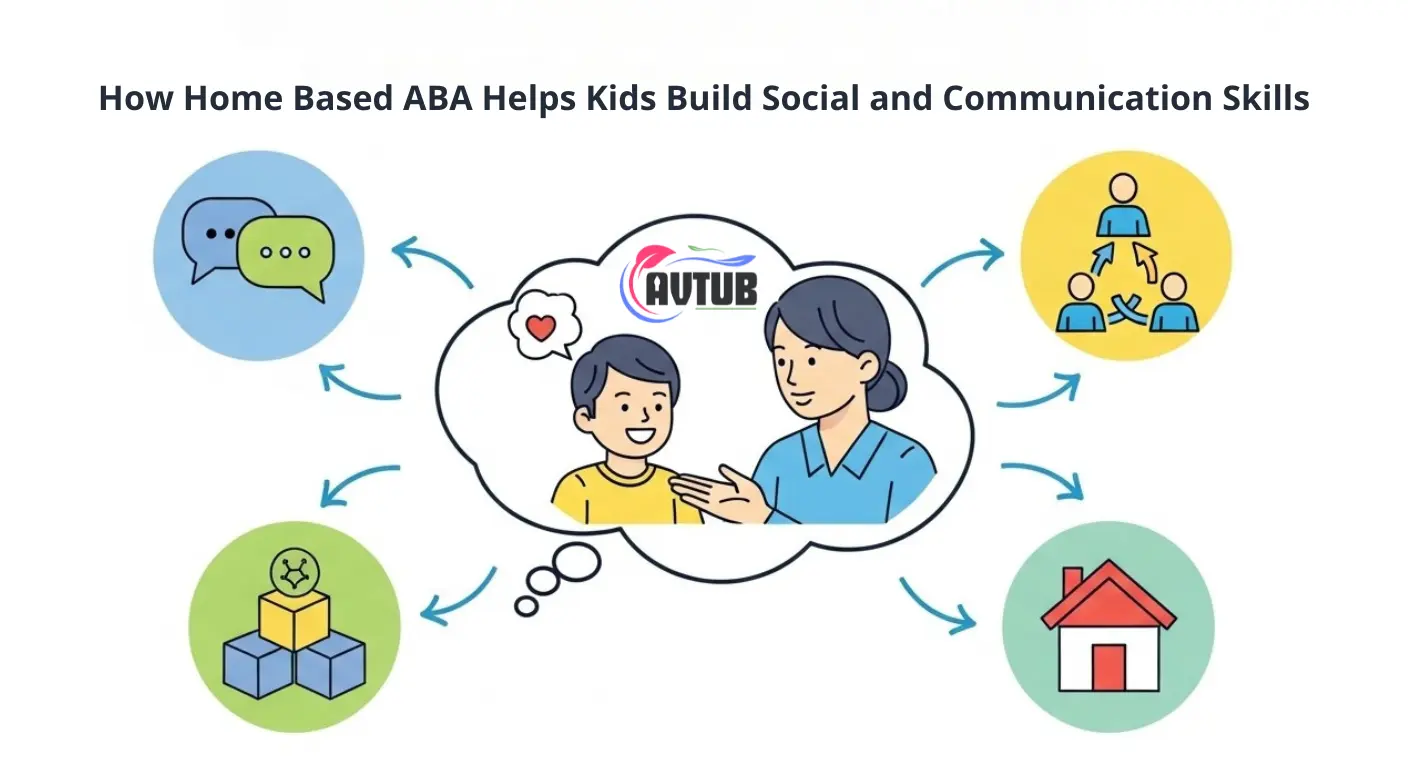Over the past decades, home-based ABA has grown as one of the most effective and family-friendly approaches to teaching kids important social and communicational skills. Relocation of treatment to the natural environment of the child enables the ABA professional to address real-life interactions, family routines, and challenges pertinent to day-to-day living. This results in accelerated learning, better generalization of learned skills, and involved family participation.
Understanding Home Based ABA Therapy
Home-based ABA therapy makes use of evidence-based practices to increase appropriate behaviors, communication, and social interaction. Instead of taking the child to the clinic or center, certified ABA therapists go to the comfort of one’s home to afford the child an opportunity to learn in comfortable surroundings. In this kind of environment, the child is at ease and suffers fewer distractions, thus enabling him to interact with his family naturally.
Home-based ABA therapy employs the use of reinforcement, modeling, prompting, and structured play in teaching meaningful skills that enable the individual to continue growing long after active treatment. Generally, areas of concern for ABA are social and communication skills, since these are quite crucial for learning, relationships, and independence.
If you’re looking for ABA therapy services in North Carolina, we’re here to support you. Personalized home-based ABA support is designed to strengthen communication, social skills, and daily life routines. We go side by side with our families using compassionate therapists and evidence-based programs to ensure every child gets the guidance they need for continued growth, learning, and prospering.
Why Social and Communication Skills Matter
Social-communication skills enable the child to express their needs, follow directions, communicate with peers, and then participate in daily activities. It lays the foundation for making friends, becoming team players, holding conversations, and enjoying themselves both at school and in social settings.
Many children find it important to get direct support so as to learn.
- How to initiate conversations
- How to make eye contact
- How to share with others while playing
- How to Understand Gestures
- How to React to Questions
- Social Cues, How to Follow
- How to Express Emotions Appropriately
Home-based ABA can provide opportunities to practice such skills naturally in the same environment that a child will spend most of their time.
How Home Based ABA Builds Communication Skills
It can be verbal, non-verbal, or aided by other systems such as picture exchange and communication devices. ABA has structured and individualized plans in teaching clear and confident self-expression in children.
Encouraging Functional Communication:
The therapists teach the children to express their needs in practical ways, such as requesting food, asking for help, describing discomfort, or requesting a favorite activity. Functional communication decreases frustration and increases confidence.
Teaching Imitation Skills:
Imitation is the most necessary way of learning to communicate. First, a therapist models some simple actions, sound, or words and then helps the child in their copying. The more imitation, the faster children learn language and communication skills.
Vocabulary and Language Extension:
Home-based ABA therapy provides many natural opportunities for introducing new vocabularies during daily routines, such as mealtimes, playing, or doing chores. Learning the words about common things and activities helps children remember them and use the language appropriately.
Effective enhancement of Non-Verbal Communication:
Gestures, pointing, body language, and facial expressions are all crucial elements to communication. The children are taught such cues by the ABA therapists and when to use them appropriately. The practice within everyday settings makes generalization easier for the children.
Development of Talking Skills:
Children can be taught to initiate conversations, answer questions, and stay on topic, taking turns within the conversation. Use family members to have conversations about real-life situations; this will give children time to build confidence and become fluent in their communication.
How Home Based ABA Builds Social Skills

Social skills enable children to share with others, make friends, and take part in groups. In-home ABA makes learning social skills much more natural and effective.
Teaching Play Skills:
Play is one of the most effective ways in which children learn social interaction. The therapists use interactive games, toys, and activities to teach:
- Sharing
- Cooperative play
- Turn-taking
- Group participation
Play practice in the comfort of their home environment allows them to become relaxed and enjoy social interaction.
Encouraging Family Involvement:
Home-based therapy enables the inclusion of siblings and parents in the sessions. The child gets more opportunities to practice their social skills with people they interact with on a day-to-day basis. This encourages bonding within the family while fostering continued learning.
Scenarios of Application:
They act out basic social situations that include receiving visitors, asking for help, joining in a conversation, or engaging in household activities. Gaining such social skills within real contexts renders the children confident enough to try them out at school and in community life. However, if they encounter any difficulties in coping with social interactions, they demonstrate challenging behaviors. ABA works to find those triggers and teach positive alternatives to ask for a break, communicate their need, or otherwise offer strategies to cope.
Promoting Emotional Competencies:
They help the children identify and express their emotions and recognize the emotions of others, an important ability in the development of empathy, understanding of boundaries, and meaningful relationships.
Benefits of Home Based ABA for Social and Communication

Development Home-based ABA has a number of advantages that allow for more personalized and effective learning:
Learning in a Comfortable Environment:
Children feel secure at home and therefore can perform better and improve faster.
More Opportunities for Natural Learning:
Every routine meals, play, bedtime becomes a teaching moment. The skills learned in these settings are easier to retain and apply.
Strong Parent Training and Involvement:
The parents learn strategies they can implement during the day, consistently reinforcing the newly learned social and communication skills.
Customization Depending on Family Needs:
However, it can be adjusted according to schedule, culture of the family, and specific goals.
Improved Generalization:
The skills learned at home will easily generalize to school, playgrounds, and other community settings.
What Parents Can Expect During Home Based ABA Sessions
A typical session may include the following:
- Formal activities to teach communication
- Play-based learning to develop social skills
- Family participation and coaching
- Positive reinforcement of the desired behavior to motivate progress
- Data collection to monitor progress
- Gradual introduction to more complicated skills
Accommodations are made in the therapist’s strategies based on the progress being made to ensure continuous improvement.
Conclusion
Home-based ABA therapy is one of the most effective ways to help the child lay the ground for social and communicative skills. This, different from other settings, allows children to practice real-life interactions more frequently, improve their communication techniques, and make use of social relationships meaningful to them. Home-based ABA encourages long-term growth and confidence through family involvement, consistent structure, and evidence-based strategies.


